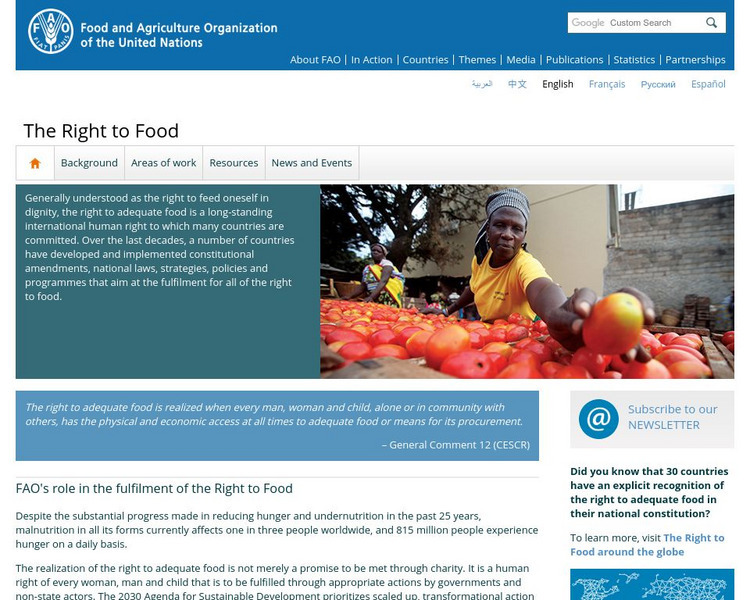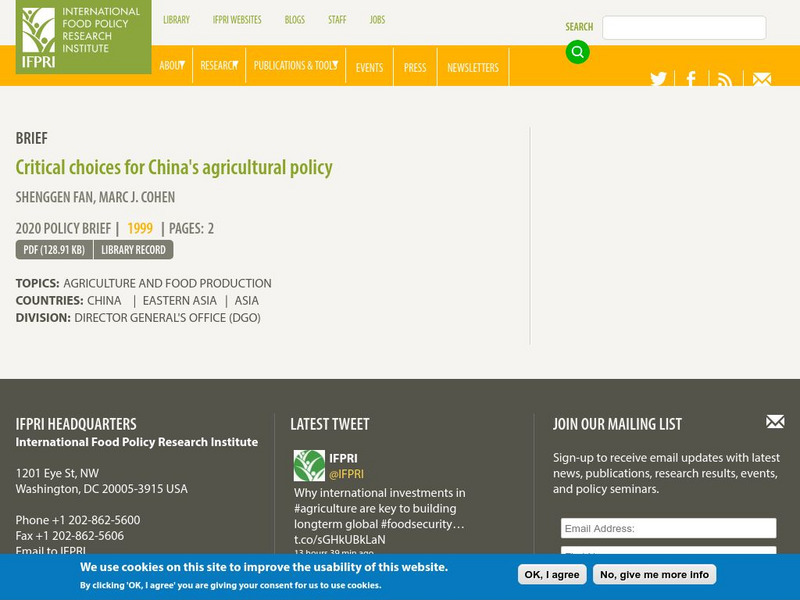Hi, what do you want to do?
National WWII Museum
Rationing by the Numbers: Quantitative Data as Evidence
What was it like to live on wartime rations in the United States during World War II? Young historians find out by exploring how those on the home front bought food thanks to the ration system. Other data includes statistics on car sales...
WE Charity
High School–Module 3: Food Waste
Advances in packaging and refrigeration help keep food fresher longer. That's just one of the ways science is addressing global food waste. With the third of five lessons from the WE Are Innovators—High School Modules set, scholars use...
WE Charity
Elementary–Module 3: Food Waste
Before pupils discard anymore of their uneaten vegetables, they may want to learn more about food waste. Here's a resource to help them do just that! Using discussion and video, scholars discover how innovators are tackling the issue. As...
California Academy of Science
Sustainable Food Solutions: Weighing the Pros and Cons
A growing demand for sustainable food systems comes from schools and even some cities. So what are some solutions? Scholars consider four different ways to approach sustainable food solutions and list the pros and cons of each. The fifth...
California Academy of Science
Our Hungry Planet: Design Thinking Challenge
Scholars investigate an issue associated with food systems and design their own solutions. Working collaboratively, they follow each step in the design process to complete the 10th lesson of the 13-part Our Hungry Planet series.
California Academy of Science
Rapid Brainstorming: How Can We Improve Our Global Food System?
In 2018, the average fast food burger cost $2.64 while a salad averaged $4.14. Does the price difference matter to public health? Scholars consider that question and others in a brainstorming session about improving our global food...
National History Day
How Did the Food Administration Convince Americans to Make Sacrifices during World War I?
During American's involvemnt in World War I, citizens on the home front became directly involved in the war effort. Scholars uncover just how Americans helped the war an ocean away with primary documents, investigative skills, and...
Channel Islands Film
Human Impact on the Food Web of Santa Cruz Island
What happens when a non-native species is introduced onto an island? Santa Cruz Island, part of the Channel Island chain located off the coast of southern California, provides the perfect laboratory for young environmental scientists to...
Food Project
Trace The French Fry
How does locally grown produce sold at a farmer's market compare to a more complex industrial system in the way they each affect the environment, people, and the economy? Pupils explore the different types of food systems and how they...
Curated OER
Seeds - What are Seeds?
At minimum, beginning botanists learn the terminology used when discussion seed germination. This set of slides lists basic seed parts, requirements for germination, steps of the process, and then it differentiates between monocot and...
Curated OER
Little Bees, Big Potential
After reading an article on the alfalfa leafcutting bee, learners chart its characteristics alongside those of the honeybee. Then they draw the leafcutter lifecycle. The article provides fascinating reading when studying the role of...
Curated OER
Acorns
Students experience hoarding food for winter. In this squirrel lesson plan, students simulate hoarding behavior as either a red or gray squirrel. Students play a game called Winter Survival and discover how squirrels survive through the...
Curated OER
Obtaining Food -- The Impact of Over-fishing
Students play a fishing game. In this food supply lesson students regulate their fishing in a game about over-fishing. The students identify resources that could be extracted from that biome.
Curated OER
Charting Mold Growth
Learners chart mold growth based on food supply. In this mold growth lesson plan, students chart micro-organism growth and the decline of the growth as food runs out.
Curated OER
World Geography: Water: The Indispensable Resource
Learners are able to explain why water is an indispensable resource in a written essay and class discussion. They identify at least three examples of where water has been a source of conflict between societies from a reading and...
Food and Agricultural Organization of the United Nations
Food and Agriculture Organization of United Nations: The Right to Adequate Food
One basic life concept is that every person has the right to adequate food. Using this interactive site, find out more about this by exploring the tabs underneath the title. The Resources section has learning resources, including...
TeachEngineering
Teach Engineering: Who's Hitchhiking in Your Food?
How can you tell if harmful bacteria are growing in your food? Students learn to culture bacteria in order to examine ground meat and bagged salad samples, looking for common foodborne bacteria such as E. coli or salmonella. After 2-7...
US Department of Agriculture
China's Food and Agriculture: Issues for the 21st Cent.
A series of reports published but the United States Department of Agriculture in April of 2002 (in PDF format) from the USDA that covers "China's food consumption, marketing, international trade, agricultural policy, transportation...
Other
Ifpri: Critical Choices for China's Agricultural Policy
A short analysis published in May 1999 by International Food Policy Research Institute of China's agricultural policies since 1978 and what the future might hold for China in the area of farming and food supply.























